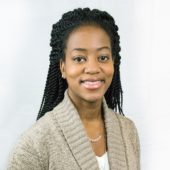Take 5 with Alana James
Alana James (’09, MAM ’10)
Associate Director, Community Engagement at Wake Downtown
1. How do you define success for yourself? What has helped you to be successful?
I used to think about success in terms of completion: seeing a project or initiative through from start to finish. Now, however, I can better appreciate the progress that comes with the process. Sometimes, success means assembling the right groups, ensuring each is well-represented and getting them involved in conversations or ideation, which can also be fraught with challenges and pitfalls. Ultimately though, if the process is inclusive and well-designed, drawing from the collective experience of those around you, the end goal becomes less of a fixation. For me, this recognition and the patience it demands have helped me find success, even when things take longer than I would have hoped, or do not materialize at all. The experience you gain is always, at a minimum, a small victory.
2. Think of a time that you faced a challenge, obstacle, or roadblock. How did you get through that and what did you learn?
The challenge that immediately comes to mind is one we are presently experiencing in the wake of COVID-19. For me more specifically, the question is how to engage meaningfully with our community during a pandemic. Tried and true methods of connecting and engaging are no longer feasible, so understanding how best to pivot has required a certain degree of comfort with discomfort. What I have learned though, is that it is okay to make these changes (e.g. providing opportunities on a much smaller or virtual scale.) While they may not yield the perfect outcome I had first envisioned, future efforts will be made stronger by maintaining critical relationships with stakeholders during this time.
3. Who are your people (either by name or role) who help you to be successful/confident/intentional/reflective/any other descriptor you want to use? And how have they helped you?
I have been fortunate to have wonderful professional and peer mentors! Some of whom are on my team and some with whom I have maintained relationships since I was a student at Wake Forest. My mentors offer perspective, especially when I am juggling several activities or losing patience with myself. More often than not, my mentors’ listening ears and probing questions are all the support I need to move more confidently through challenges (and successes!)
4. How did you find your people?
By opening up. Sometimes, I initiated and sometimes I responded, but I started speaking up about my professional and personal interests. Others followed suit, and voila, I had found my people!
5. What advice would you give to Wake Forest students as they look for their people?
Don’t be shy! Talk to people, pursue relationships, and commit to nurturing and deepening those relationships. You might find your people in an unexpected place; embrace it and allow yourself to feel the discomfort that inevitably comes with doing something new. Keep in mind, you have much to offer those around you; share it and watch your circle grow.

